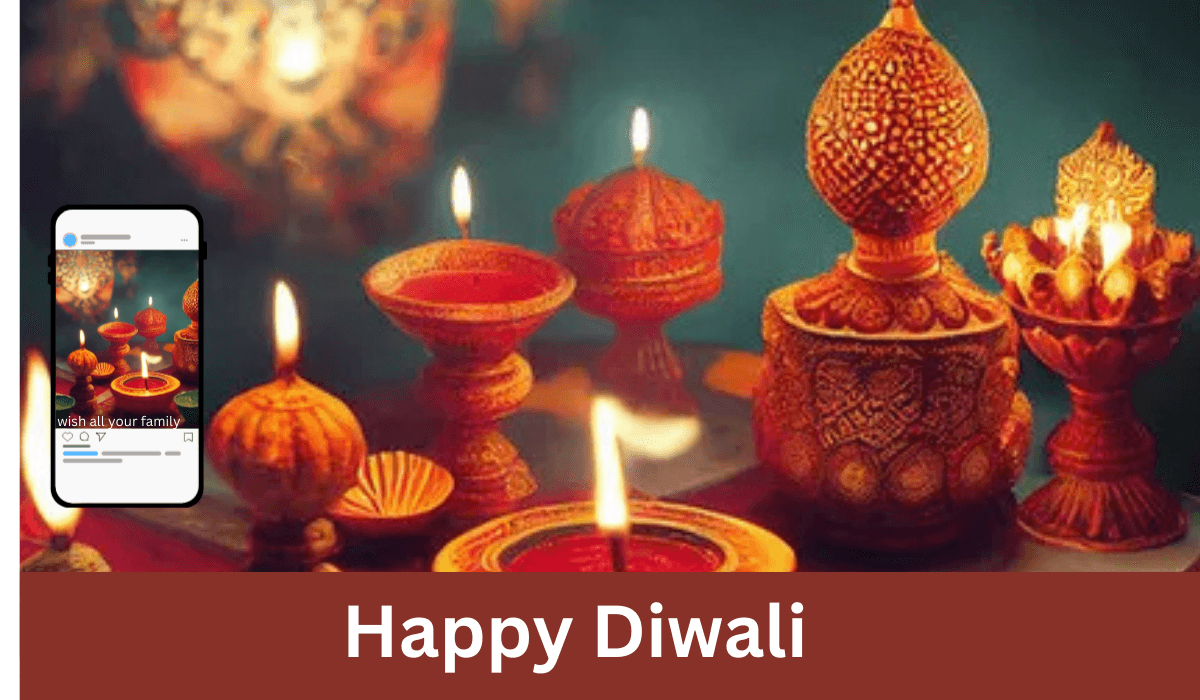Diwali, the vibrant and joyous Festival of Lights, is a cherished occasion celebrated by millions of people worldwide. Known for its deep cultural and religious significance, Diwali symbolizes the triumph of light over darkness, good over evil, and knowledge over ignorance. This five-day festival is a time for families and communities to come together, share happiness, and reflect on the values of love, unity, and prosperity.
In 2024, Diwali falls on November 1, and preparations are already in full swing across India and the world. Homes are being cleaned and decorated with beautiful lights, colorful rangoli designs, and oil lamps (diyas) to welcome the divine blessings of the festival. Firecrackers light up the night skies, and the sounds of joyous celebration fill the air, making Diwali a truly magical and unforgettable experience.
What is Diwali?
Diwali, which means “a row of lights,” symbolizes the victory of light over darkness, good over evil, and knowledge over ignorance. It is celebrated over five days, each with its own meaning and traditions. While the festival has roots in Hindu mythology, it is celebrated across India and by various communities worldwide, including Sikhs, Jains, and Buddhists, each interpreting it in their unique cultural context.
The beauty of Diwali lies in its universal message: to bring light into our lives, not only by illuminating our homes but also by fostering positivity, love, and kindness. It’s a celebration that reminds us to be grateful for what we have, to mend broken relationships, and to begin anew with a fresh perspective.
Why We Celebrate Diwali in 2024: A Message of Unity and Hope
Diwali isn’t just about decorations, gifts, or the rituals; it’s about fostering unity, love, and compassion. The festival provides an opportunity to come together, forgive past grievances, and strengthen our relationships. In 2024, Diwali reminds us of the importance of hope and resilience, especially after the challenges of recent years.
The festival also promotes values that resonate deeply with today’s world, such as kindness, inclusion, and mindfulness. Celebrating Diwali means embracing both tradition and the new values that contribute to the welfare of society as a whole. As we light diyas this year, we also illuminate our lives with these ideals, creating a ripple effect of positivity in our community
The Five Days of Diwali Celebrations
Diwali spans five days, each with its own significance and traditional activities. Here’s a look at how each day is celebrated:
- Dhanteras: The festival begins with Dhanteras, a day dedicated to wealth and prosperity. People buy new items like gold, silver, or kitchenware as it is believed to bring luck. Houses are cleaned, and lamps are lit to welcome Goddess Lakshmi.
- Naraka Chaturdashi (Choti Diwali): The second day is known as Choti Diwali or Naraka Chaturdashi. It’s a time to rid oneself of negativity. People clean their homes, apply fragrant oils, and prepare for the main Diwali celebrations.
- Diwali (Lakshmi Puja): The main day of Diwali involves worshipping Goddess Lakshmi. Families decorate their homes with colorful rangolis and light diyas, candles, and electric lights. In the evening, families perform a Lakshmi Puja, inviting prosperity and well-being into their homes.
- Govardhan Puja: This day commemorates Lord Krishna’s lifting of Mount Govardhan to protect his people. People prepare special meals and sweets, offering gratitude for abundance and sustenance.
- Bhai Dooj: The final day is Bhai Dooj, a celebration of the bond between brothers and sisters. Sisters pray for their brothers’ well-being and perform a small ritual, while brothers give gifts in return.
The Historical and Religious Significance of Diwali
Diwali, or Deepavali as it is also known, has its roots in Hindu mythology, but it is celebrated by people of various faiths, including Sikhs, Jains, and some Buddhists, each adding their own unique customs and meanings to the festival. For Hindus, Diwali commemorates the return of Lord Rama to his kingdom of Ayodhya after a 14-year exile, during which he defeated the demon king Ravana. His return is seen as the victory of good over evil, light over darkness.
Jains celebrate Diwali as the day Lord Mahavira, the 24th Tirthankara, attained nirvana or spiritual enlightenment. For Sikhs, Diwali marks the release of Guru Hargobind Ji, the sixth Sikh Guru, from imprisonment, symbolizing freedom and justice. In all traditions, Diwali represents new beginnings, hope, and the pursuit of righteousness.
A Glimpse into Diwali’s Rich History and Legends
The history of Diwali is as colorful and varied as the lights and fireworks that mark its celebration. Different regions in India celebrate Diwali for various reasons, based on diverse myths and legends. Here are some of the most popular stories behind Diwali:
- Lord Rama’s Return to Ayodhya: Perhaps the most well-known legend associated with Diwali is the return of Lord Rama, his wife Sita, and his brother Lakshmana to Ayodhya after 14 years of exile. Rama’s people lit diyas (oil lamps) throughout the kingdom to celebrate his homecoming, marking the beginning of the festival.
- Goddess Lakshmi’s Blessings: In other parts of India, Diwali is celebrated as the day the goddess Lakshmi emerged from the ocean of milk during the churning of the sea (Samudra Manthan). Goddess Lakshmi, the deity of wealth and prosperity, is worshipped on Diwali, with people praying for her blessings for prosperity and good fortune.
- The Victory of Krishna Over Narakasura: In southern India, Diwali commemorates the victory of Lord Krishna over the demon Narakasura, symbolizing the triumph of good over evil.
These tales emphasize one common theme: the triumph of virtue and righteousness, which continues to resonate with people across cultures.
You May Also Like!
- CUET UG 2025 Registration Closes Tonight: Last Chance to Apply for Admission to Top Universities
- Meet the Everlasting IPL OGs: The Players Who’ve Stayed from 2008 to 2025
- JKPSC KAS Prelims Admit Card 2025: Download Admit Card PDF | Documents to Carry to the Exam Center
- Aakash Chopra Reacts to BCCI’s New Rule Requiring Players to Travel Together for Matches and Practice
- FCI Salary Structure 2025 , Benefits, and Career Growth Opportunities
Diwali Traditions: A Time for Renewal and Joy

The celebration of Diwali is marked by various customs and rituals that differ from region to region, but the essence remains the same — to spread light, love, and positivity. One of the most common traditions is the cleaning and decorating of homes, symbolizing the removal of negativity and the welcoming of prosperity and good fortune. People also adorn their homes with rangolis, intricate designs made with colored powders, rice, and flowers, often placed at the entrance as a sign of welcome to guests and deities.
Lighting diyas or oil lamps is one of the central elements of Diwali. These small, glowing lamps are placed in homes, courtyards, and temples, representing the victory of light over darkness. In many households, the lighting of diyas is accompanied by prayers to Goddess Lakshmi, the goddess of wealth and prosperity, seeking her blessings for the coming year.
In addition to these spiritual practices, Diwali is also a time for sharing gifts, sweets, and warm wishes with family, friends, and neighbors. Fireworks and crackers are lit to celebrate the joyous occasion, adding a touch of excitement to the festivities. The exchange of gifts, particularly sweets like laddus, barfis, and kaju katli, is a way of strengthening relationships and spreading happiness.
Heartfelt Diwali Wishes: Spreading Light and Love
A key tradition of Diwali is the exchange of heartfelt wishes, which is seen as a way of spreading the festival’s light and joy beyond one’s own home. These wishes encapsulate the spirit of Diwali, offering love, blessings, and positivity to those we hold dear. In the digital age, personalized Diwali greeting cards and messages have become increasingly popular, allowing people to connect with loved ones no matter where they are in the world.
Traditional Diwali wishes often focus on themes of prosperity, health, and happiness. Some examples include:
- “Wishing you a Diwali filled with love, light, and laughter. May this festival bring joy and prosperity to your life.”
- “May the divine light of Diwali illuminate your path and bring you peace, happiness, and success. Happy Diwali!”
- “May the glow of the diyas and the echo of the chants fill your life with happiness and contentment. Wishing you a blessed Diwali.”
For those looking for shorter, more concise greetings, Diwali quotes like “Wishing you a sparkling Diwali filled with joy and laughter!” or “May the light of Diwali bring peace and happiness to your life” serve as thoughtful ways to share the festive spirit.
Diwali Wishes for Family and Friends
Diwali is a time to reflect on the importance of family, friends, and the bonds that hold us together. Sending personalized wishes to family members and close friends is a meaningful way to express gratitude and love during the festival. Here are some examples of Diwali wishes tailored for loved ones:
- “On this auspicious occasion, I am grateful for your presence in my life. May our bond grow stronger with each passing Diwali. Happy Diwali, dear [name]!”
- “May the warmth of Diwali fill your home and heart with love and happiness. Wishing you a joyous celebration with your loved ones.”
- “Sending you my warmest wishes on Diwali. May this festival bring you closer to your dreams and aspirations. Happy Diwali, my dear friend!”
These messages, whether shared in person or through greeting cards, help strengthen the bonds of love and unity that Diwali celebrates.
Wishing for Prosperity, Success, Health, and Happiness
Diwali is not only a time for celebration but also a time to reflect on the year gone by and to set positive intentions for the year ahead. Many Diwali wishes focus on prosperity, success, and well-being, as the festival is believed to bring good fortune and new opportunities.
For those wishing to send blessings of prosperity and success, messages like “May the divine blessings of Diwali bring you success in all your endeavors” or “May the glow of diyas illuminate your path to success and happiness” resonate deeply during this auspicious time.
Health and happiness are also central themes during Diwali, as it is a time for personal and collective renewal. Some popular wishes include:
- “On this Diwali, I pray for your good health, happiness, and well-being. May you and your family be blessed with a long and fulfilling life. Happy Diwali!”
- “May the brightness of Diwali fill your life with positivity and good vibes. May you always be surrounded by love, laughter, and good health.”
These heartfelt messages reflect the true spirit of Diwali, which is about spreading joy and positivity to those around us.
Embracing the Spirit of Diwali
As Diwali 2024 approaches, the Festival of Lights reminds us of the importance of light, love, and unity in our lives. It is a time for reflection, renewal, and connection with loved ones. Through traditional rituals, joyful celebrations, and the exchange of heartfelt wishes, Diwali brings people together in a shared celebration of life’s blessings.
Whether lighting a diya, creating a colorful rangoli, or sending a message of love and goodwill to friends and family, the essence of Diwali lies in the positivity and light we share with the world. As we prepare to celebrate this beautiful festival, let us remember to spread happiness, embrace the spirit of giving, and cherish the bonds that unite us. Happy Diwali to all!



